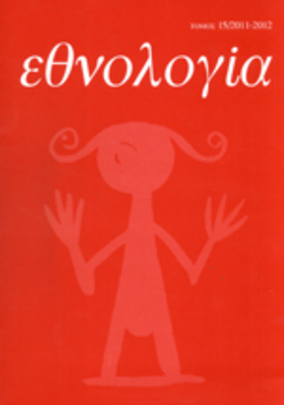Ο «ιστορικός τόπος» και η σημασία της «παράδοσης» για το έθνος-κράτος
Part of : Εθνολογία : περιοδική έκδοση της Ελληνικής Εταιρείας Εθνολογίας ; Vol.4, No.1, 1995, pages 107-126
Issue:
Pages:
107-126
Parallel Title:
The «historic locus» and the meaning of «tradition» for the nation-state
Author:
Abstract:
This article, which partly relies on material from the dissertation thesis Praxes of Tradition and Modernity in a Village in Northern Greece (Indiana University, 1995), explores how the designation of the old part of a village in Northern Greece as a «historic locus» is a version of the past that responds to the present needs of the nation-state. For nation-states, «tradition» constitutes an account of the past -a symbolic system- which identifies culture with a specific geographic territory, thus ascertaining the nation-state’s independence and sovereignty, and legitimizing its present. In this sense, tradition is an ideological construct, which derives its political meanings from the present.For the Greek nation-state, the critical message of the past has always been its national sovereignty. The uses of the past, nonetheless, have not been in all times the same. In the 19th century «tradition» was identified with the lives of the then contemporary peasants. The analysis of the designation of the old part of a village as a «historic locus» demonstrates the changes that the past as a symbolic system has undergone in the present.In a historic locus, the old houses are seen to represent «tradition» and to encompass the claims for national sovereignty by making claims of authenticity, of uniqueness, and of historical continuity with the past, but of difference from the present. The specification of the morphological and architectural characteristics of the past, which are seen to incorporate tradition and to be expressions of the cultural uniqueness of the group, is accompanied by the specification of the kinds of changes that can be made on the old houses and the kinds of new buildings which can be built in the designated area. These specifications aim at the preservation and protection not just of the ideally unique and authentic architectural forms, but of what they represent: the cultural heritage, which is the symbol-essence of a nation-state.The designation of a historic locus restricts the «authentic» material expressions of people’s lives into those designated ones, by setting not only the space, but also the time, which are historically and culturally significant. This designation decontextualizes the objects from the material conditions of their production and it symbolically idealizes them in order to become unique, authentic, and ideally produced within the group. To that end, cultural borrowings are abolished, as they are thought to reveal relationships indicative of the nonuniqueness of the group. For the same reason, the present is also not included in the culturally significant time. The perception of the present as in a condition of globalization leads to a rejection of contemporary village life as not «locally produced.» In that frame, the symbols of cultural uniqueness and of national sovereignty are established in a past time, which gets properly filtered of all elements that show of contacts and of inter-group relationships. For an even more effective decontextualization of past village life, the living conditions of the poor are used to construct discontinuity between the village and the rest of the world. This discontinuity, however, between the past and the present in people’s lives constitutes a state-time, which does not represent the social past that the local people experience themselves.
Subject:
Subject (LC):
Notes:
Το κείμενο αυτό βασίζεται σε υλικό της διδακτορικής διατριβής του γράφοντος Praxes of Tradition and Modernity in a Village in Northern Greece που υποστηρίχθηκε το Σεπτέμβριο του 1995 στο Indiana University των Η.Π.Α., Περιέχει βιβλιογραφία




